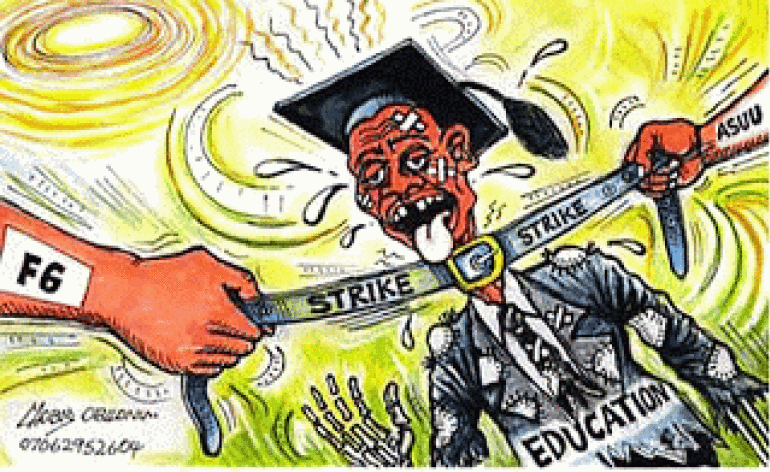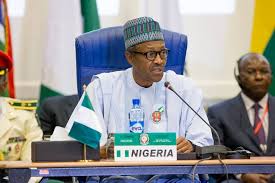It is no longer news that the Academic Staff Union of Universities’ “conditionally suspended” its five-week-old strike embarked upon to force the Federal Government to implement the 2009 agreement and the Memorandum of Understanding of 2013. Since the MoU was not honoured and only ASUU, not the Federal Government, was showing understanding before now, the new consensus reached was changed to a Memorandum of ‘Action’ with the mindset of attached implementable timelines. In the days to follow, other unions will begin to toe the line of the MoA and no longer the MoU as if dynamics of terminology will make the leopard change its skin. I dare say it is a sad day and bleak future for the education of the children of the masses. Beyond shedding crocodile tears about the abysmal ranking of Nigerian universities by the Buhari government at university convocations where they deliver speeches, it is the height of hypocrisy for the Minister of Education, Mallam Adamu Adamu, or President Muhammadu Buhari to charge universities to conduct ground-breaking researches when they have failed to commit funds to that effect.
It is shameful that only N20bn could be mustered by the Federal Government out of the expected N220bn second tranche towards the revitalisation of public universities. But before the end of the year, children of politicians will graduate in the UK varsities. I am no longer perturbed as a nation that can allow medical doctors to proceed on strike while many died has shown lowest form of empathy. Where would President Buhari have regained health if the UK government had not ensured a sound and functional health system? If the UK educational system is not properly structured and funded, where would the children of the elite who conspired to ruin public institutions take their children to?
While campuses will come alive again with students, parents and business concerns spiritualising the strike suspension with testimonies in churches and mosques, nothing qualitative should be expected and let no one talk about anything half-baked from Nigerian universities for there is no magic that can be performed when we attempt to fill a perforated basket with water. The learning environment will still be in that state of disrepair. Lecturers are back to teaching with old textbooks, bad laboratories, terrible offices, ill-motivated academic staff and an uncommitted workforce.
The strike brought to the fore the insensitivity of the ruling class to a critical sector like education. In concrete terms, N23bn out of the N128bn of Earned Academic Allowances is to be released to the university managements for payment of the 2009/2010 academic session! While the 2009 agreements was to lapse in 2012, what this implies is that it may require more strikes (perhaps not less than five strike actions) to get the balance of N102bn and universities are already in the 2017/2018 session! The Federal Government has also agreed to continue to take responsibility for university staff schools. On revitalisation, government indicated its inability to pay the second tranche of the sum of N220bn per annum but agreed to release N20bn as a sign of commitment for revitalisation of 84 public varsities! This is to be paid in September (N10bn) and October (N10bn). On salary shortfalls, it was agreed that all shortfalls and arrears would have been liquidated by the end of October 2017. The Federal Government also agreed to direct the Central Bank of Nigeria to create separate interest-yielding accounts at Treasury Bill rates for university endowment funds, research grants and other such similar funds. This still awaits the CBN governor’s action. Further to this, Federal Government is to write state governments regarding the proliferation of tertiary institutions without proper funding of existing ones. On the registration of Nigerian University Pension Management Company, the Federal Government agreed that the registration will be done within one week of “submission of the appropriately completed forms and documents to PenCom”. Before signing the MoA, ASUU has submitted this and it is now up to government to release the licence. Besides, ASUU is required to make proposals on the altered guideline on retirement of professors.
Education is critical to liberate the masses from the shackles of poverty and neo-colonial slavery under democratic governance. Unfortunately, our educational system stinks. Little wonder we produce politicians who only think about themselves when they get to power because they were never catered for. Unknown to them (politicians), their children will not know peace. The untrained children of today will make their lives miserable. As the Yoruba saying goes, Omo tí a kò tó, ni yóò gbé ilé tí a kó tà (the untrained child will ultimately sell the built castle).
This MoA pads the future of university education in Nigeria. At best, a majority of the items were reached in “principle” but lecturers will still be supervising students on credit; endure excess workloads without pay and work in a dysfunctional system where academic excellence is subdued by the political-academics. It is sad that the agreement over the revitalisation which ASUU is still fighting to implement was meant for 2009 (N472,031,575,919), 2010 (N497,531,778,701), 2011 (N548,768,190,681) totalling one trillion, five hundred and eighteen billion, three hundred and thirty-one million, four hundred and fourty-five thousand, three hundred and four naira only (N1, 518, 331, 545, 304). Only N200 billion released in 2013 by the Jonathan administration remained the only revitalisation money.
Our priorities are not right and we can’t develop with a myopic policy formulators and implementers. While we continue to allocate about seven per cent of our national budget to education, Botswana allocated 28.8 per cent to education; while Ghana allocated 15.3 per cent. Today, Ghana under President Nana Akufo-Addo is enjoying free secondary school education which grants over 400,000 children of the masses access public education. In Nigeria, the narrative is “when it is free, students will not be serious”. Little wonder, Ghana rakes billions of dollars from Nigerian students. While the University of Ibadan anthem says “a mind that knows is a mind that is truly free”, Nigerian leaders prefer to rule over mumu. They preside over a country with over 10 million children who are out of school. Education is an enduring legacy and a visionary leader must invest in it to drive homegrown developmental strategies that take into consideration our peculiarities.
ASUU needs to be more engaging and shun the growing tendency of infiltration of its ranks and ideological leanings by ethnic, political and economic sentiments. It must continue to be the voice of the silenced majority. A vibrant leadership is needed to sustain the legacies of the likes of Harvard-based Biodun Jeyifo, Attahiru Jega, Dipo Fashina and the late Festus Iyayi. The union must make a pre-budget presentation to the Federal Ministry of Education to capture in monetary terms implementable agreement for the incoming year. This will guide against expressing shock when it is not captured. This is because politicians and their civil servant allies will only capture spoons and knives for the President as well as air conditioning systems for offices that have no electricity and will never think towards education. Except by miracle, the timelines would be faithfully adhered to but the future looks bleak with public education with the present generation of padders and growing weak pressure groups.
CULLED FROM punchng.com



